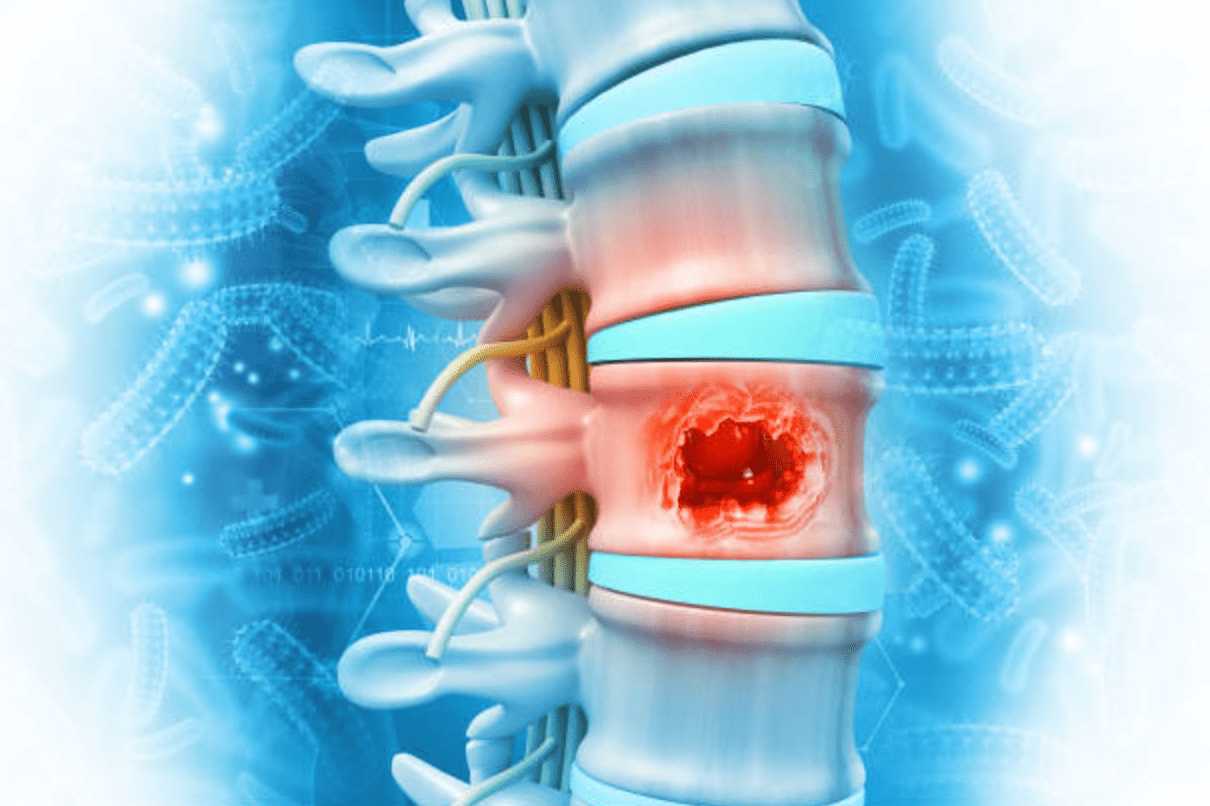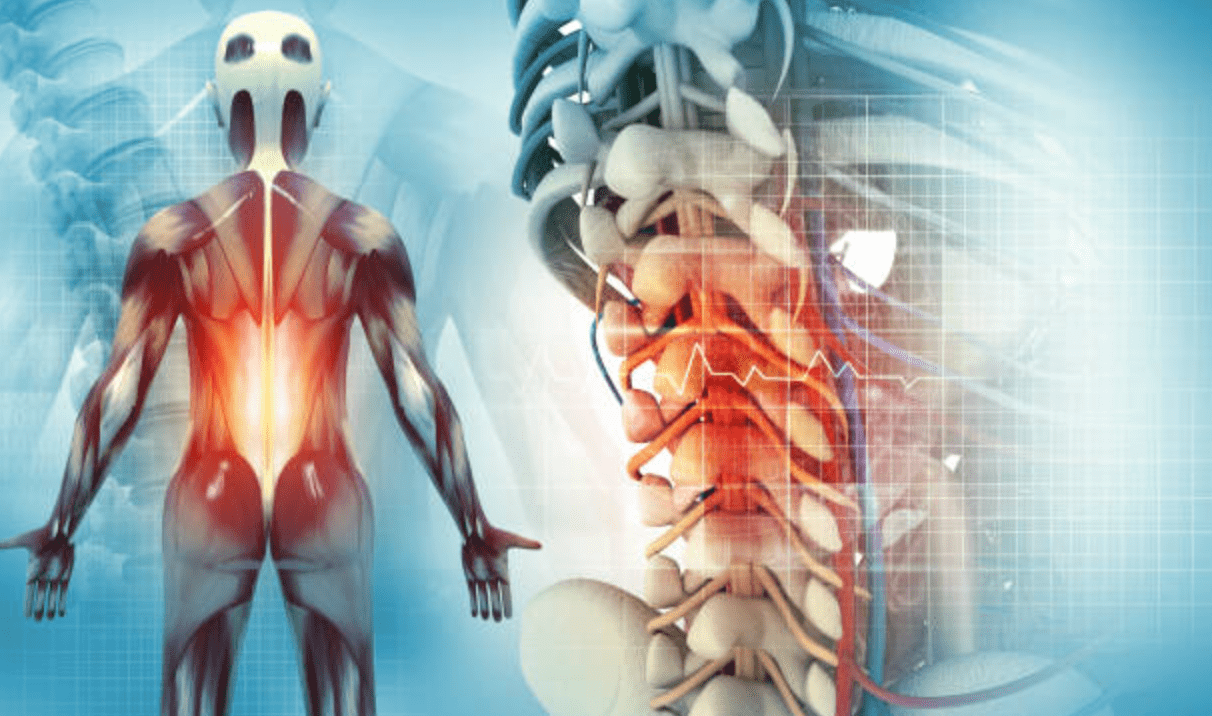Imagine a father-son duo playing soccer. Father bends to pick up the ball and feels a sense of discomfort. He may take it casually, but there might be some underlying factors. Yes, a degenerative disc could be a possibility, remember, not a necessity.
The term degenerative here implies that the symptoms will get worse with time and age. Despite the name ‘disease,’ it is not a disease but rather a condition in which natural, age-related wear-and-tear on a disc causes pain, instability, and other symptoms.
In this blog post, we will provide in-depth information about degenerative discs, their signs, and things to avoid with degenerative disc disease.
Understanding Degenerative Disc Disease
Degenerative disc disease (DDD) is a common condition characterized by the breakdown of the intervertebral discs in the spine. These discs act as cushions between the vertebrae, providing flexibility and shock absorption ability to the spine. As we age, the discs naturally degenerate and lose water content, becoming less flexible and more prone to damage. However, in degenerative disc disease, this process occurs at an accelerated speed, leading to symptoms such as back pain, stiffness, and mobility issues.

Several factors can contribute to the development of disc degenerative disease.
- Age factor: Disc degenerative disease is more common in older adults, as the discs naturally degenerate over time.
- Genetics: Some people may inherit a predisposition to disc degeneration, making them more susceptible to Disc degenerative disease.
- Accidents and injuries to the spine can accelerate the degenerative process and increase the risk of developing disc degenerative disease.
- Sedentary Lifestyles or habits such as smoking, obesity, and poor posture can also contribute to the development and progression of degenerative disc disease.
Degenerative Disc Disease and its Symptoms
Degenerative disc disease (DDD) can be visible through various signs and symptoms, often causing discomfort and reduced mobility. While Degenerative Disc Disease primarily affects the spine, its symptoms can extend to the upper back and neck, impacting your ability to perform.

Chronic or intermittent back pain is one of the most common symptoms of DDD.
This pain is typically centered on the affected area of the spine and may vary in intensity. It can range from a dull ache to sharp, stabbing pain. Exercises like running, High-intensity interval training, or prolonged periods of sitting or standing may also worsen your DDD.
Degenerative Disc Disease in Neck
When Degenerative Disc Disease affects the cervical spine (neck region), individuals may experience neck pain in addition to or apart from back pain. This pain can radiate into the shoulders, causing further discomfort and reducing the range of motion.
DDD can also cause stiffness in the affected area of the spine, making it difficult to move freely.

You might experience stiffness during a morning walk or after prolonged periods of inactivity.
This can improve with gentle movement and stretching.
With the progress of degenerative changes in the spine, there is a risk of nerve compression, leading to symptoms such as tingling, numbness, or weakness in the affected disc. These symptoms can affect the arms, hands, legs, or feet, considering the point of pain.
Things to Avoid with Degenerative Disc Disease in Neck and Back!
When dealing with a degenerative disc disease, one must practice certain precautions. Let’s take a look at things you must avoid while managing a degenerative disc condition.
1. A Sedentary Lifestyle
A sedentary lifestyle is often related to not being active, disturbed sleep, improper food habits, etc.

While extensive physical activity can be harmful, being too sedentary can also contribute to stiffness and weakness in the spine. It’s essential to find a balance and engage in regular, gentle exercise. However difficult it may sound, following a balanced lifestyle can improve your productivity and quality of life.
2. Intense Exercise
It’s ok to go with intense exercise, even with DDD. But before you actually hit the ground, make sure those exercises are safe for your back health.

High-impact activities that involve sudden or jarring movements, such as jumping or running on hard surfaces, can put excessive strain on your spine and worsen the degenerative disc. You can avoid high-impact exercises and opt for low-impact alternatives like swimming or cycling. Your back is resilient and can get better with time.
To ensure your back and neck’s speedy recovery without the risk of injury, you can practice joint stretches and mild exercises. This will help maintain mobility and increase joint and muscle flexibility.
3. Improper Lifting Techniques
Improperly lifting heavy weights can strain the muscles and exacerbate disc degeneration.

If lifting is necessary, then use proper lifting techniques and consider using assistive devices or asking for help when lifting heavy loads. Also, gentle stretching exercises should be considered before and after the heavy lifting.
4. Prolonged Sitting or Standing
Any movement is healthy for the spine.

Sitting for long periods reduces blood flow to the different structures of the back, increases pressure on the spine, and can aggravate degenerative disc symptoms. Frequent movement can help keep the joints of the spine lubricated and helps to provide nutrition to the discs.
The list does not end here; continue reading.
5. Poor Posture
Slouching or hunching over can put extra strain on the spine and contribute to disc degeneration.

Moreover, this can cause some peripheral problems like obesity. Practice good posture habits, such as sitting up straight and maintaining a neutral spine alignment while standing and walking. It’s important to note that maintaining posture while standing is equally important, especially when using mobile phones.
6. Smoking
Smoking can reduce blood flow to the spine and inhibit the body’s ability to repair damaged discs. Quitting smoking or avoiding exposure to secondhand smoke can help slow the progression of degenerative disc disease.

Some evidence suggests that nicotine may have a direct toxic effect on the nucleus cells. This harms the long-term health of the disc and its functional ability. All these detrimental changes imply that smokers not only invite immediate health hazards but also accelerate disc degeneration.
7. Inflammatory Foods
Our immune system activates when it encounters anything it doesn’t recognize, like viruses, bacteria, chemicals, and foreign particles. Once recognized, our body initiates an “attack” mode, sending out inflammatory cells to fight invaders and heal damaged tissue.

When you receive a wound on your knee, your body sends inflammatory cells to that area, resulting in acute inflammation. Chronic inflammation happens over time when a body can’t repair and overcome the level of damage done to a wound, for example, gangrene.
Certain foods like aerated, sugary drinks, fried chips, white bread, pasta, pastries, ham, bacon, and other processed and red meats can contribute to increased inflammation. Try to remove them from your diet as much as possible.
Some add-ons to the list. Why avoid knowing more about the things to avoid with degenerative disc disease?
Why undermine some valuable points? However, most people tend to ignore it and suffer for a long time.
8. Overuse of Medications
Medicines, especially painkillers, are considered the first-line response to counter Degenerative Disc pain.

Over-the-counter pain medications are more favored for temporary relief; however, they are not recommended for long-term use. Prescription medications are also effective, but they come with a risk of side effects and heavy dependency.
9. Stress
Carrying the baggage of emotional stress can exacerbate physical symptoms, contributing to muscle tension, which can further worsen your back pain associated with degenerative disc disease.

Practicing stress-reducing techniques such as mindfulness, meditation, or deep breathing exercises can help to manage stress levels.
10. Ignorance Towards Symptoms
Your body shows signs of ill health well in advance.

It’s important to listen to your body and not ignore any symptoms. Ignoring symptoms can lead to further discomfort and complications. If you experience persistent or severe pain, numbness, or weakness, you should seek medical attention promptly.
Wrapping Up
Degenerative disc disease is a common condition that can affect individuals of all ages. However, with knowledge, proactive measures, and appropriate treatment, its impact on daily life can be minimized.
In this blog post, we have shared in detail about the things to avoid with degenerative disc disease. We hope you found the information useful.
FAQs on Things to Avoid with Degenerative Disc Disease
Although we have discussed in detail degenerative discs and the things to avoid with degenerative disc disease, if you have come this far, you should definitely check out some popular FAQs.
1. Can I Continue Lifting Heavy Objects if I have degenerative Disc Disease?
It’s generally advisable to avoid heavy lifting as it can aggravate the pain, putting more strain on the disc. Lifting should be carried out using proper techniques, such as bending the knees and keeping the back straight. Also, take the help of a trainer, especially at the gym.
2. Is it Safe to Engage in High-Impact Sports Such as Running or Basketball with a Degenerative Disc Disease?
The straight answer is no, and it is not safe to engage in high-impact sports. These can worsen symptoms and accelerate degeneration. Chiropractors usually recommend low-impact exercises like swimming or cycling as they are gentler on the spine.
3. Should I Avoid Sitting for Long Periods of Time?
Yes, you should avoid sitting for long hours and prefer movements and little stretches. Prolonged sitting can increase pressure on the affected disc and lead to discomfort in the whole spine.
It’s essential to take regular breaks, change positions, and use ergonomic chairs or lumbar supports for better spinal alignment.
4. Can Smoking Affect Degenerative Disc Disease?
Yes, smoking can hamper blood flow to the spine and restrict the body’s ability to absorb nutrients, which may worsen disc degeneration. Quitting smoking can help slow down the progression of the disease.
Are there specific foods I should avoid to manage degenerative disc disease?
While there’s no specific diet for degenerative disc disease, maintaining your weight is crucial, as excess weight can strain the spine. Limiting the intake of foods high in sugar and saturated fats and consuming a balanced diet rich in fruits, vegetables, and proteins can support overall spine health.